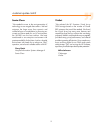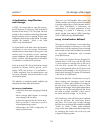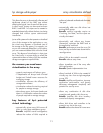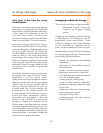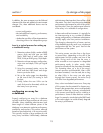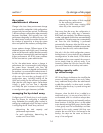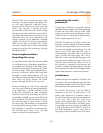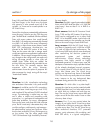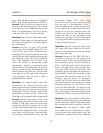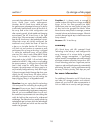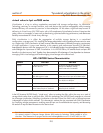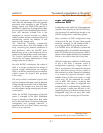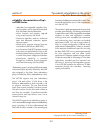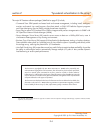
section 2
VA7000 virtualization, managed at the array
level, offers the advantage of providing greater
granularity when managing a pool of logical
storage. Logical Unit Name (LUN) capacity is
definable as a logical set of storage blocks rather
than as a specific set of predefined physical disks.
Each LUN becomes scalable from a few
megabytes to several terabytes by adding
capacity without operator intervention (the array
automatically controls the addition of new
capacity to the storage pool).
This “self-tuning” capability automatically
restripes data across new disks added to the
array, minimizing any potential imbalances of
data distribution within the VA7000 series.
Redistribution occurs in the background with no
impact on SAN bandwidth or server performance.
This function significantly reduces the efforts
required by the system administrator to keep
storage resources in balance.
Also with VA7000 virtualization, the number of
LUNs is no longer restricted by the amount of
physical storage. Administrators can configure
LUNs up to the limit permitted by the architecture
without concern for physical disk groupings
within arrays.
Disk arrays without virtualization support LUNs
only from contiguous free space, requiring allocation
of large storage chunks even if only a small portion
is necessary. As changes occur over time, data
must be moved or storage reconfigured to recover
unused space.
Within the VA7000, fragmentation of physical
space is managed at the RAID (Redundant
Arrays of Inexpensive Disks) block level rather
than in disk-sized chunks. The impact of free-space
management and “garbage collection” is
absorbed at the array level, without consuming
SAN or server resources.
super redundancy
enhances RAID
2
As alternatives to the “self-tuning” LUN-management
capability described above, the VA7000 series
also enhances LUN performance through its use
of RAID configurations “redundancy groups.”
Many variations to RAID configurations have
surfaced over the past 10 years. Most provide
moderate variations on the standard RAID 1
(mirroring) and RAID 5 (striping) techniques.
In its VA7000 Series, HP delivers a variation that
substantially adds to its availability characteristics.
RAID 5DP (Double Parity) approaches a RAID 6
solution in that it enables recovery from simultaneous
failures in two disks without loss of any data.
While this might seem superfluous in RAID arrays
of only a few disks, it becomes critical in
configurations supporting a large number of
disks in a virtual array. The potential for disruption
due to disk failure grows with the number of
disks involved in an array. The goal of virtualization
is to remove the physical constraints, which
enables dozens of disks to be used in a single
virtual array. HP has addressed this concern
with its RAID 5DP solution, increasing data
availability by two orders of magnitude over
traditional RAID 5 implementations. Additionally,
use of storage is made more efficient as very
large RAID groups (up to dozens of disks) are now
manageable using only two parity disks rather
than a parity disk for each group of five disks.
Technology Trends
Copyright © 2001 by D.H. Brown Associates, Inc.
2.1
“hp extends virtualization to the array”
—by D.H. Brown Associates, Inc.



